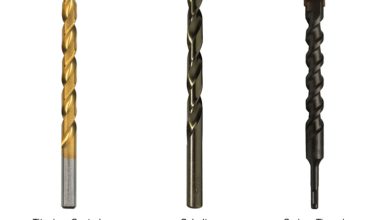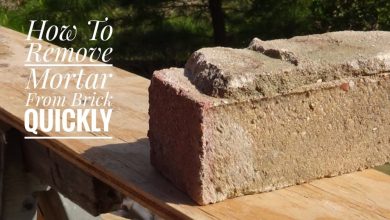Is Concrete Masonry Unit Sustainable
Yes, concrete masonry units are considered sustainable due to their durability and fire resistance.
These structures have a service life of 50+ years and require minimal maintenance throughout their lifespan.
Concrete masonry construction also consumes minimum materials, energy, and resources during the construction process.
Additionally, concrete masonry units do not rust, rot, or burn, making them resistant to natural and man-made disasters.
This resilience in design and materials is a key characteristic of “green” buildings and structures.
Did You Know?
1. Concrete masonry units (CMUs) are often made from waste materials such as fly ash, a byproduct of coal combustion, making them environmentally sustainable.
2. CMUs have excellent thermal insulation properties, helping to reduce energy consumption and ensuring a more sustainable construction process.
3. Due to their high density, CMUs have superior sound insulation qualities, contributing to a quieter and more sustainable living environment.
4. The production process of CMUs releases significantly fewer greenhouse gas emissions compared to traditional bricks, making them a more sustainable choice for construction.
5. CMUs are highly durable and require minimal maintenance, resulting in a longer lifespan and reduced waste generation, further emphasizing their sustainability.
Durability And Fire Resistance
Concrete masonry construction is widely considered sustainable due to its exceptional durability and fire resistance. Concrete masonry units (CMU) are designed to withstand harsh environmental conditions, offering long-lasting performance. The inherent strength of concrete makes it a highly reliable building material.
Concrete masonry structures have a service life of 50+ years, making them a preferred choice for long-term sustainable construction. The durability of CMU is attributed to its resistance to weathering, erosion, and impact. This reduces the need for frequent repairs and minimizes waste generated from replacing damaged materials.
Furthermore, fire resistance is a standout feature of concrete masonry. Unlike other building materials, concrete does not burn or release toxic gases when exposed to fire. This enhances the safety of occupants and surrounding communities. Concrete masonry acts as a barrier against the spread of flames, effectively containing fires and limiting their impact.
Long Service Life
Concrete masonry units (CMU) offer an impressive service life that exceeds 50 years. This longevity surpasses many other construction materials, making CMU a sustainable choice for long-term building projects. The extended lifespan of CMU reduces the need for frequent renovations and replacements, thereby lowering the environmental impact associated with construction activities.
Moreover, the long service life of concrete masonry contributes to the reduction of waste generated from demolished structures. By significantly extending the time before a building needs to be replaced, CMU minimizes the amount of construction debris that ends up in landfills, thus promoting a more sustainable waste management system.
- Concrete masonry units have a service life of more than 50 years
- CMU reduces the need for frequent renovations and replacements
- Less environmental impact associated with CMU construction
- CMU minimizes construction debris in landfills
“The extended lifespan of CMU reduces the need for frequent renovations and replacements, thereby lowering the environmental impact associated with construction activities.”
Minimal Material, Energy, And Resource Consumption
Concrete masonry construction has several advantages:
-
Minimal materials, energy, and resources: Compared to alternative building materials like wood or steel, concrete masonry units require fewer raw materials. This reduces strain on natural resources and helps conserve energy.
-
Thermal insulation properties: Concrete masonry provides excellent thermal insulation, reducing the need for energy-intensive heating and cooling systems in buildings. The thermal mass of CMU helps stabilize indoor temperatures, decreasing reliance on artificial mechanical systems and reducing energy consumption.
-
Efficient construction techniques: Concrete masonry units can be quickly and easily installed due to their simplicity and efficiency. This saves time and reduces labor costs, resulting in overall cost savings for construction projects.
-
Additional benefits:
- Durability: Concrete masonry construction is known for its long-lasting durability.
- Fire Resistance: CMU offers good fire resistance, providing enhanced safety in buildings.
- Sound Insulation: Concrete masonry units have excellent sound insulation properties, minimizing noise transmission between spaces.
Concrete masonry construction offers numerous benefits, including minimal material usage, energy conservation, excellent thermal insulation, and efficient installation techniques. Moreover, it provides durability, fire resistance, and sound insulation.
Low Maintenance Requirements
One of the significant advantages of concrete masonry units is their low maintenance requirements throughout their service life. Unlike other materials that may require regular inspection and maintenance to prevent deterioration, CMU is highly resistant to wear, decay, and pests.
The durability of concrete masonry eliminates the need for costly and time-consuming maintenance tasks, such as repainting, resealing, or replacing damaged components. This not only saves money but also reduces the consumption of additional resources and materials.
Furthermore, the low maintenance requirements of CMU contribute to the overall sustainability of buildings and structures. By avoiding the need for constant repairs and maintenance, concrete masonry minimizes disruptions to daily activities and extends the usable life of a structure.
- Concrete masonry units have low maintenance requirements
- Highly resistant to wear, decay, and pests
- Eliminates need for costly and time-consuming tasks like repainting and resealing
- Saves money and reduces consumption of resources
- Contributes to overall sustainability of buildings and structures
- Minimizes disruptions to daily activities
- Extends the usable life of a structure.
Resistance To Rust, Rot, And Fire
Concrete masonry units (CMU) offer inherent resistance to rust, rot, and fire, making them an ideal choice for sustainable construction. Unlike materials such as steel or wood, concrete does not corrode or deteriorate over time, even when exposed to moisture or harsh weather conditions. This resistance to rust and rot significantly extends the lifespan of CMU structures and reduces the need for frequent repairs or replacements.
Moreover, the fire resistance of concrete masonry is a crucial aspect in sustainable construction. Concrete does not burn, and its slow thermal conductivity helps to limit the spread of fire. This attribute not only ensures the safety of occupants but also minimizes the damage caused by fires, reducing the environmental impact and promoting sustainable building practices.
Benefits of concrete masonry units for sustainable construction:
- Durability and longevity
- Fire resistance
- Minimal material and energy consumption
- Low maintenance requirements
- Resistance to rust, rot, and fire
In conclusion, concrete masonry units are a sustainable choice for construction due to their durability, fire resistance, long service life, minimal material and energy consumption, low maintenance requirements, and resistance to rust, rot, and fire. These characteristics contribute to the reduction of environmental impact, waste generation, and resource depletion. The future of concrete masonry looks promising as more emphasis is being placed on sustainable building practices, and CMU continues to be recognized as an essential component of green buildings.
Check this out:
Frequently Asked Questions
Are masonry walls sustainable?
Masonry walls can be considered sustainable due to their low manufacturing costs. The production of raw materials for masonry does not generate significant waste, as any remaining materials can be recycled back into the shaping process. This recycling process allows for a continuous production cycle, reducing waste and promoting the efficient use of resources. Additionally, the durability and longevity of masonry walls contribute to their sustainability, as they require minimal maintenance and can last for many years without the need for replacement.
Is using concrete in construction sustainable?
Concrete is a highly sustainable construction material due to its long lifespan and durability. Unlike other materials that may decay or require frequent replacement, concrete structures can last for decades, reducing the need for constant resource consumption and waste generation. Additionally, concrete has a high thermal mass, enabling it to absorb and store heat, which can contribute to reducing energy consumption for heating and cooling buildings. Its versatility and ability to be recycled also make concrete a sustainable choice, as it can be repurposed for new projects or crushed and used as aggregate for future construction.
Furthermore, the use of concrete can help mitigate the impact of natural disasters. Concrete structures have proven to be resilient against forces like earthquakes and hurricanes, providing safety and minimizing the need for costly rebuilding efforts. This further emphasizes the sustainability aspect of concrete, as it contributes to the long-term preservation of our built environment and the conservation of resources. Overall, considering its natural properties, durability, recyclability, and ability to withstand disasters, concrete emerges as a sustainable solution in construction.
Are concrete blocks sustainable?
Concrete blocks are indeed sustainable due to various reasons. Firstly, concrete masonry construction utilizes readily available and frequently recycled raw materials, reducing environmental impact. This promotes sustainability as it minimizes the need for excessive extraction of virgin resources. Additionally, concrete blocks offer energy efficiency by acting as exceptional thermal insulators, helping to reduce energy consumption for heating and cooling purposes. Moreover, their durability and long-lasting nature contribute to sustainability by minimizing the need for frequent replacements and reducing waste generation. Overall, concrete blocks provide an environmentally responsible choice for construction.
Are concrete walls sustainable?
Concrete walls are indeed a sustainable choice due to their numerous advantages. The energy efficiency of concrete walls is worth noting, as they offer excellent insulation properties, reducing the need for additional heating or cooling. This not only minimizes energy consumption but also decreases greenhouse gas emissions. Additionally, concrete walls are renowned for their durability and long lifespan, resulting in lower life-cycle costs. This means fewer replacements over time, reducing the environmental impact of construction waste. Moreover, concrete walls exhibit remarkable resilience against both natural and man-made disasters, offering enhanced safety and security in various scenarios.


